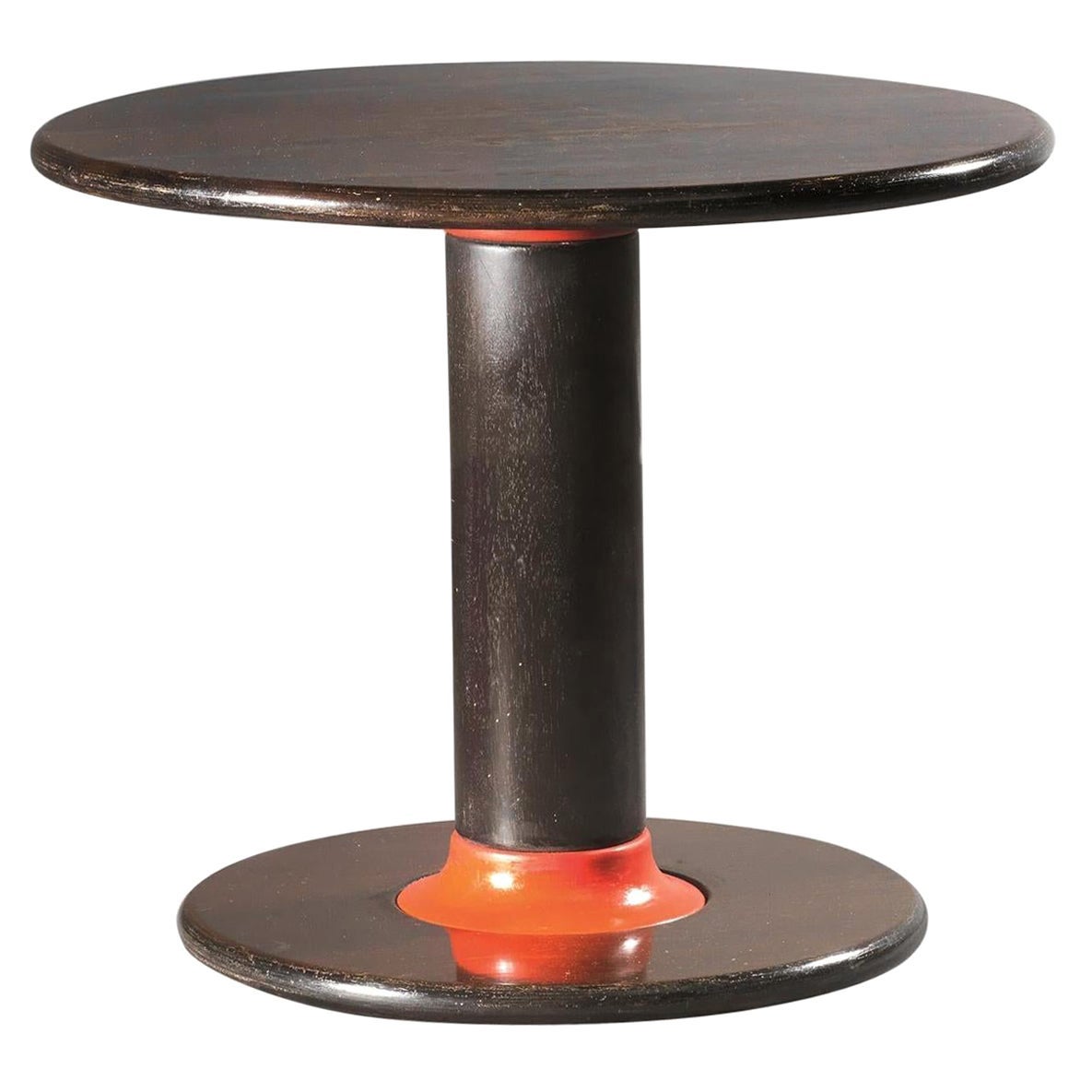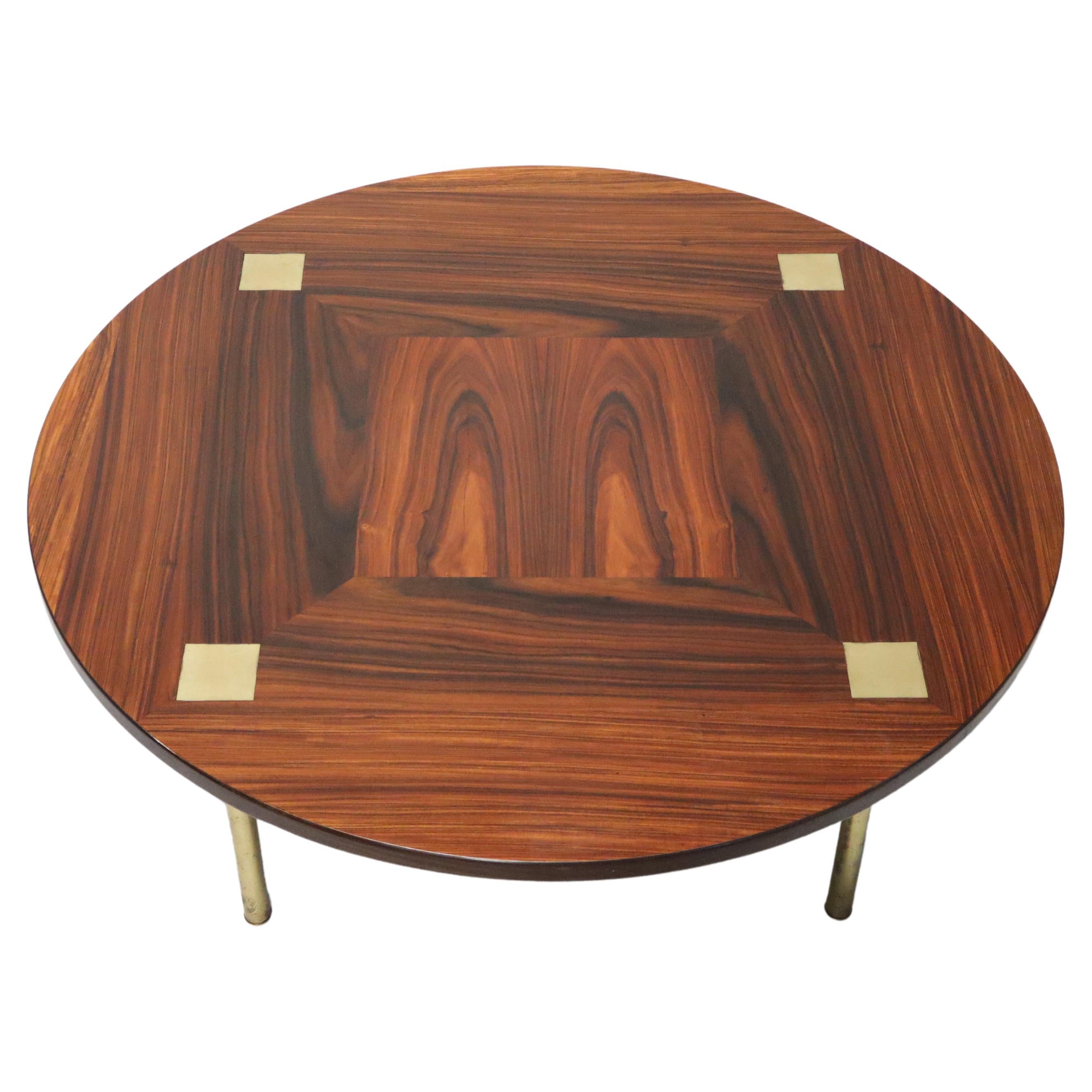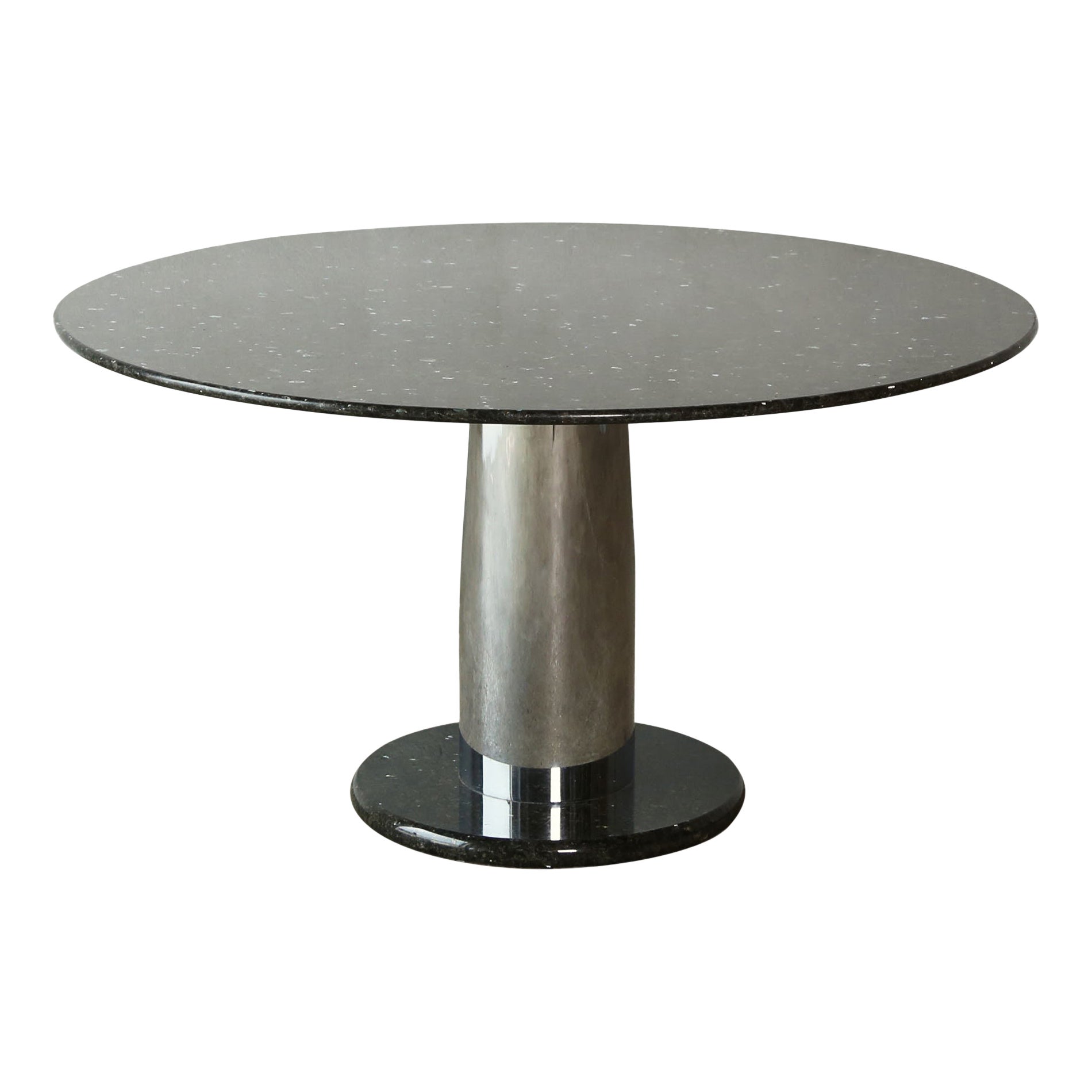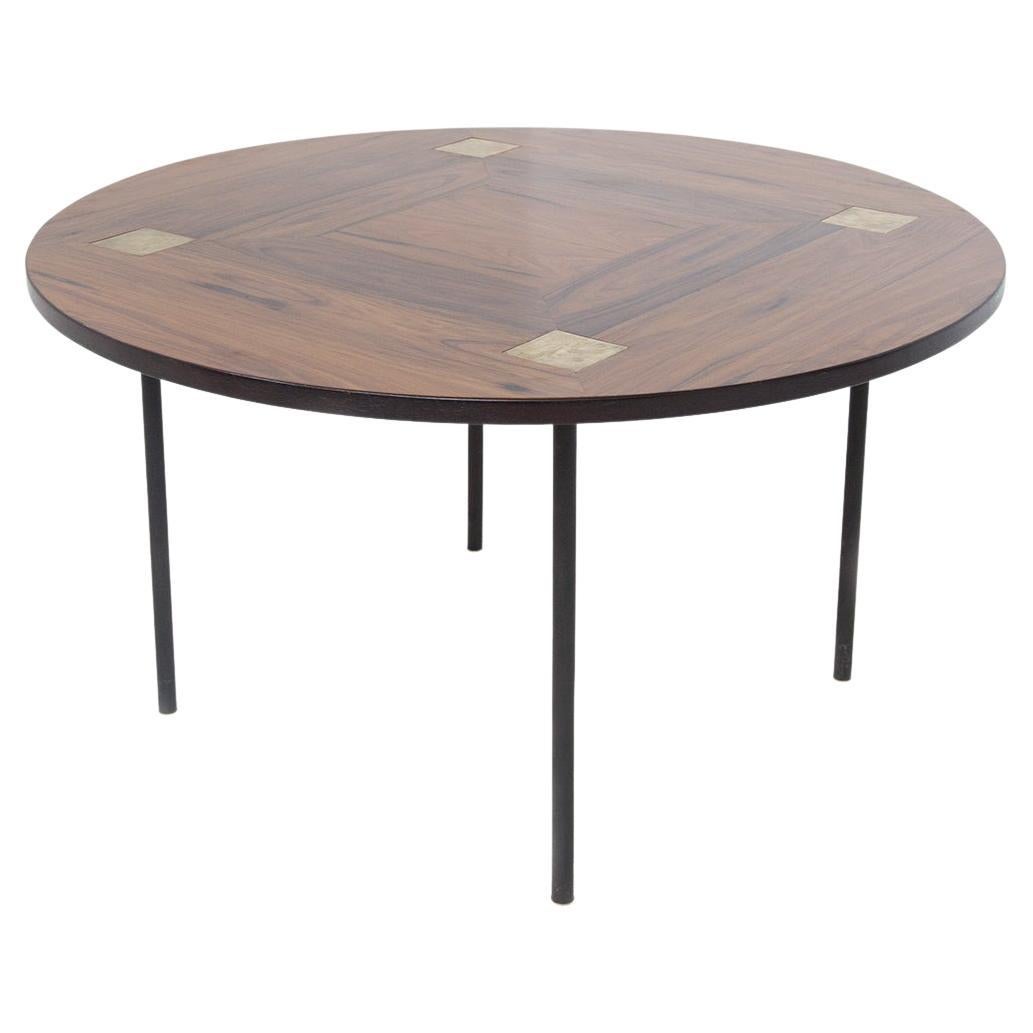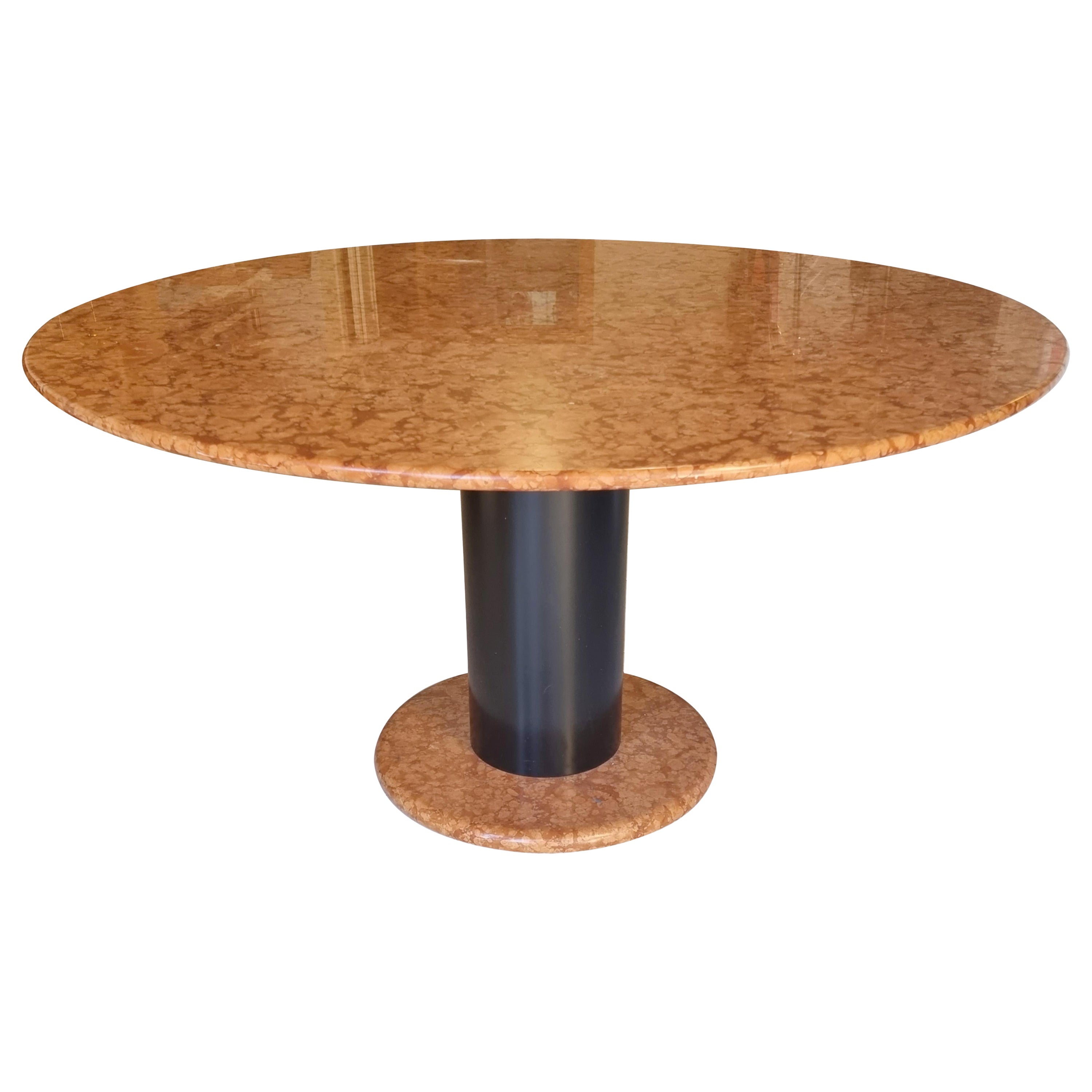Ettore Sottsass T72 Round Table in Wood and Brass by Poltronova 1950s
About the Item
- Creator:Poltronova (Manufacturer),Ettore Sottsass (Designer)
- Dimensions:Height: 27.56 in (70 cm)Diameter: 57.09 in (145 cm)
- Style:Mid-Century Modern (Of the Period)
- Materials and Techniques:
- Place of Origin:
- Period:
- Date of Manufacture:Late 1950s
- Condition:Wear consistent with age and use. Very good vintage condition.
- Seller Location:Montecatini Terme, IT
- Reference Number:1stDibs: LU5304229845892
Ettore Sottsass
An architect, industrial designer, philosopher and provocateur, Ettore Sottsass led a revolution in the aesthetics and technology of modern design in the late 20th century.
Sottsass was the oldest member of the Memphis Group — a design collective, formed in Milan in 1980, whose irreverent, spirited members included Alessandro Mendini, Michele de Lucchi, Michael Graves and Shiro Kuramata. All had grown disillusioned by the staid, black-and-brown “corporatized” modernism that had become endemic in the 1970s. Memphis (the name stemmed from the title of a Bob Dylan song) countered with bold, brash, colorful, yet quirkily minimal designs for furniture, glassware, ceramics and metalwork. They mocked high-status by building furniture with inexpensive materials such as plastic laminates, decorated to resemble exotic finishes such as animal skins. Their work was both functional and — as intended — shocking. Even as it preceded the Memphis Group's formal launch, Sottsass's iconic Ultrafragola mirror — in its conspicuously curved plastic shell and radical pops of pink neon — embodies many of the collective's postmodern ideals.
Sottsass's most-recognized designs appeared in the first Memphis collection, issued in 1981 — notably the multihued, angular Carlton room divider and Casablanca bookcase. As pieces on 1stDibs demonstrate, however, Sottsass is at his most imaginative and expressive in smaller, secondary furnishings such as lamps and chandeliers, and in table pieces and glassware that have playful and sculptural qualities.
It was as an artist that Ettore Sottsass was celebrated in his life, in exhibitions at the Los Angeles County Museum of Art, in 2006, and the Philadelphia Museum of Art a year later. Even then Sottsass’s work prompted critical debate. And for a man whose greatest pleasure was in astonishing, delighting and ruffling feathers, perhaps there was no greater accolade. That the work remains so revolutionary and bold — that it breaks with convention so sharply it will never be considered mainstream — is a testament to his genius.
Poltronova
Poltronova is known for embracing the creativity that opposites can introduce to a space. Its radical modernist furniture and lighting fixtures are simultaneously grounded in classic aesthetics and inspired by what were then new and provocative artistic movements in mid-century Italy, when the company was founded. This tension resulted in unique and extraordinary pieces at the manufacturer, from eccentric, glove-shaped armchairs to striking dining tables that feature a mix of materials and textures.
Italian designer Sergio Cammilli founded Poltronova in Tuscany in 1957. That same year, it won the Compasso d’Oro for the Panchetto chair designed by Luciano Nustrini. Revolutionary Italian architect Ettore Sottsass — a maestro of postmodern design who would later establish the Memphis Group — came on board as an art director in 1958. Poltronova manufactured many of his furniture and ceramic designs. Sottsass’s lighting, seating and other works for Poltronova showcase the designer’s bold experimentation with solid wood, glass, metal and laminate materials.
Other established names in Italian furniture design collaborated with Poltronova’s Sottsass and Cammilli, including Giovanni Michelucci, Gae Aulenti and Angelo Mangiarotti. However, the company truly set itself apart in its collaborations with Superstudio and Archizoom Associati, groups that were part of an irreverent, avant-garde movement in art and design that took shape during the 1960s in Florence, Turin and Milan. Collectives associated with the movement — which would one day be called Italian Radical design — drew on Pop art and minimalism and explored working with unconventional materials to create colorful, quirky and uniquely shaped objects and furnishings. At the time, Poltronova also worked with up-and-coming names in the art world, like painter Max Ernst and sculptor Mario Ceroli.
Poltronova showcased its groundbreaking designs in many exhibitions, such as “La Casa Abitata,” which was held in Florence in 1965. At Milan's Eurodomus trade show in 1970, Poltronova debuted an entire bedroom collection designed by Sottsass — including his sensuous Ultrafragola mirror. The brand’s furnishings were included in a 1972 exhibition at New York’s Museum of Modern Art called "Italy: The New Domestic Landscape," and in 1977, Poltronova again won the Compasso d’Oro for a book called Fare Mobili con Poltronova (Making Furniture with Poltronova).
Poltronova's enduring and acclaimed furniture designs came to be loved far outside Italy. During the 1960s, importer Charles Stendig represented the company and helped introduce it to the American market.
In 2005, Poltronova established the Centro Studi Poltronova to recreate some of the company's iconic furniture. The brand has also recently collaborated with English architect Nigel Coates, who worked with a Poltronova master craftsman in Italy to design a series of limited-edition furniture in 2011, including the Domo chair.
On 1stDibs, find vintage Poltronova tables, seating, storage cabinets and more.
- ShippingRetrieving quote...Ships From: Borgo a Buggiano, Italy
- Return PolicyA return for this item may be initiated within 7 days of delivery.
- Ettore Sottsass Rocchetto Round Side Table in Walnut Wood by Poltronova 1964By Poltronova, Ettore SottsassLocated in Montecatini Terme, ITRocchetto side table realized in lacquered walnut wood with bright orange decorations (under the table top and on the base), it was designed by Ettore Sottsass and manufactured by Po...Category
Vintage 1960s Italian Post-Modern Tables
MaterialsWood, Plastic, Walnut
- Ettore Sottsass Canada Armchair in Blue Velvet and Wood Poltronova 1960sBy Poltronova, Ettore SottsassLocated in Montecatini Terme, ITCanada settee armchair with a structure in wood, seat and back in padded blue-green velvet. It was designed by Ettore Sottsass Jr in 1959 and produced by the Italian company Poltro...Category
Vintage 1950s Italian Mid-Century Modern Armchairs
MaterialsVelvet, Wood
- Ettore Sottsass Califfo Two-Seater Sofa in Wood and Velvet by Poltronova 1960sBy Poltronova, Ettore SottsassLocated in Montecatini Terme, ITTwo-seater Califfo sofa with a structure in a orange/red lacquered wood seat and back are structured by cushions upholstered with velvet fabric in a mixed...Category
Vintage 1960s Italian Post-Modern Sofas
MaterialsFabric, Wood, Velvet
- Ettore Sottsass Rectangular Wooden Coffee Table by Poltronova 1960s ItalyBy Poltronova, Ettore SottsassLocated in Montecatini Terme, ITA rectangular low coffee table entirely made in wood, designed by Ettore Sottsass for Poltronova, Agliana 1960s. The son of an architect, Ettore Sottsass Jr. (1917-2007) was born i...Category
Vintage 1960s Italian Mid-Century Modern Coffee and Cocktail Tables
MaterialsWood
- Franco Albini TL30 Round Table in Metal and Wood for Poggi Pavia 1950s ItalyBy Franco Albini, PoggiLocated in Montecatini Terme, ITRound table model TL30 with black lacquered metal base and a wooden top. Designed by Franco Albini for Poggi, Pavia in 1950s. After spending his childhood and part of his youth in Robbiate in Brianza, where he was born in 1905, Franco Albini moved with his family to Milan. Here he enrolled in the Faculty of Architecture of the Polytechnic and graduated in 1929. He starts his professional activity in the studio of Gio Ponti and Emilio Lancia, with whom he collaborates for three years. He probably had his first international contacts here In those three years, the works carried out are admittedly of a twentieth-century imprint. It was the meeting with Edoardo Persico that marked a clear turning point towards rationalism and the rapprochement with the group of editors of “Casabella”. The new phase that that meeting provoked starts with the opening of the first professional studio in via Panizza with Renato Camus and Giancarlo Palanti. The group of architects began to deal with public housing by participating in the competition for the Baracca neighborhood in San Siro in 1932 and then creating the Ifacp neighborhoods: Fabio Filzi (1936/38), Gabriele D’Annunzio and Ettore Ponti (1939). Also in those years Albini worked on his first villa Pestarini. But it is above all in the context of the exhibitions that the Milanese master experiments his compromise between that “rigor and poetic fantasy” coining the elements that will be a recurring theme in all the declinations of his work – architecture, interiors, design pieces . The opening in 1933 of the new headquarters of the Triennale in Milan, in the Palazzo dell’Arte, becomes an important opportunity to express the strong innovative character of rationalist thought, a gym in which to freely experiment with new materials and new solutions, but above all a “method”. Together with Giancarlo Palanti, Albini on the occasion of the V Triennale di Milano sets up the steel structure house, for which he also designs the ‘furniture. At the subsequent Triennale of 1936, marked by the untimely death of Persico, together with a group of young designers gathered by Pagano in the previous edition of 1933, Franco Albini takes care of the preparation of the exhibition of the house, in which the furniture of three types of accommodation. The staging of Stanza per un uomo, at that same Triennale, allows us to understand the acute and ironic approach that is part of Albini, as a man and as a designer: the theme addressed is that of the existenzminimum and the reference of the project is to the fascist myth of the athletic and sporty man, but it is also a way to reflect on low-cost housing, the reduction of surfaces to a minimum and respect for the way of living. In that same year Albini and Romano designed the Ancient Italian Goldsmith’s Exhibition: vertical uprights, simple linear rods, design the space. A theme, that of the “flagpole”, which seems to be the center of the evolution of his production and creative process. The concept is reworked over time, with the technique of decomposition and recomposition typical of Albinian planning: in the setting up of the Scipio Exhibition and of contemporary drawings (1941) the tapered flagpoles, on which the paintings and display cases are hung, are supported by a grid of steel cables; in the Vanzetti stand (1942) they take on the V shape; in the Olivetti store in Paris (1956) the uprights in polished mahogany support the shelves for displaying typewriters and calculators. The reflection on this theme arises from the desire to interpret the architectural space, to read it through the use of a grid, to introduce the third dimension, the vertical one, while maintaining a sense of lightness and transparency. The flagpole is found, however, also in areas other than the exhibition ones. In the apartments he designed, it is used as a pivot on which the paintings can be suspended and rotated to allow different points of view, but at the same time as an element capable of dividing spaces. The Veliero bookcase...Category
Vintage 1950s Italian Mid-Century Modern Dining Room Tables
MaterialsMetal
- Giovanni Offredi Sunny Round Pedestal Table in Wood and Glass by Saporiti 1970sBy Saporiti, Giovanni OffrediLocated in Montecatini Terme, ITSunny pedestal table with a structure in wood and a round-shaped tabletop in smoked glass, designed by Giovanni Offredi and manufactured by Saporiti during the 1970s. Giovanni Offredi was a prominent Italian furniture and product designer of the second half of the 20th century. As opposed to most of the other Italian furniture designers of his time, Giovanni Offredi was not an architect, nor did he start designing early in his professional career. Instead, Offredi partially fits the career path of some of the talented contemporary designers who pursue product design outside of formal education in architecture. The earliest furniture design work known by Giovanni Offredi consists of exemplary furnishings made specifically for some of wealthy families in Milan. Such is the case of the works done by Offredi for Casa C., in 1960, in Gorgonzola, a small town 14 miles from Milan. These works were designed with a surprisingly minimal simplicity and elegance, and they also clearly display a hallmark of his design work with the use of angular lines and exposed metal or wood frames—not unlike some of the modern Scandinavian designs of the time. In the late 1960s, Giovanni Offredi met Sergio Saporiti, the owner of an Italian design shop and furniture maker Saporiti, and in 1970, Offredi formalized a partnership with the furniture maker. This partnership would be long and successful and resulted in many furniture designs of distinct precision that were clearly modern and innovative and that went on to enjoy considerable commercial success. The most prominent furniture designs that Offredi made for Saporiti include the Paracarro table...Category
Vintage 1970s Italian Post-Modern Dining Room Tables
MaterialsSmoked Glass, Wood
- Dining Table by Ettore Sottsass, PoltronovaBy Poltronova, Ettore SottsassLocated in Brussels , BEDining table by Ettore Sottsass, Poltronova.Category
Vintage 1970s Italian Mid-Century Modern Dining Room Tables
MaterialsMarble
- Low Table by Ettore Sottsass in Wood and Brass by Poltronova 1950sBy Poltronova, Ettore SottsassLocated in Rovereta, SMLow or living room round table with four brass legs, wooden top, and brass details. The particular table top features beautiful decoration due to the wood grain and also has four b...Category
Vintage 1950s Italian Mid-Century Modern Coffee and Cocktail Tables
MaterialsBrass
- Ettore Sottsass Lotto Rosso / Super Loto Dining Table, Poltronova, Italy, 1970sBy Ettore SottsassLocated in London, GBA Lotto Rosso / Super Loto dining table designed by Ettore Sottsass and produced by Poltronova, Italy, 1970s. In very good original condition. Fast ship...Category
Mid-20th Century Italian Mid-Century Modern Dining Room Tables
MaterialsGranite, Metal
- Vintage Wood and Brass Living Room Table by Ettore Sottsass, PublishedBy Poltronova, Ettore SottsassLocated in Milano, ITGorgeous wooden living room table designed by Ettore Sottsass in 1959, belonging to the T72 model, for the fine Italian manufacture Poltronova. Published on Ettore Sottsass book...Category
Vintage 1950s Italian Mid-Century Modern Center Tables
MaterialsMetal, Brass
- Vintage Marble Table by Ettore Sottsass for Poltronova, Italy 1960s.By Poltronova, Ettore SottsassLocated in Roma, ITVintage Marble Table by E. Sottsass for Poltronova, Italy 1960s. Vintage table realized in 1965 by Ettore Sottsass for Poltronova. Top and base in ''Rosso di Verona'' marble and b...Category
Vintage 1960s Italian Dining Room Tables
MaterialsMarble, Metal
- Italian mid-century modern table Loto Rosso by Ettore Sottsass Poltronova, 1965By Poltronova, Ettore SottsassLocated in MIlano, ITItalian mid-century modern table Loto Rosso by Ettore Sottsass Poltronova, 1965 Round dining table mod. Loto Rosso. The round top and base are in white Carrara marble, with rounded s...Category
Vintage 1960s Italian Mid-Century Modern Dining Room Tables
MaterialsMarble, Metal

